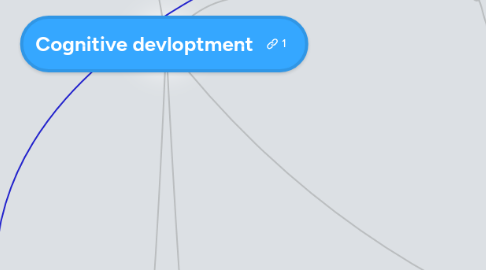
1. what is it?
1.1. developtment of
1.1.1. growth
1.1.2. adaptation
1.1.3. change that occurs over a lifetime
2. Piaget's theory
2.1. what is it?
2.1.1. stage based theory on cognitive developtment related to age and explain the abilities and inabilities present in each age group.provides us with the idea of every individual and drive for equilibrium (Eggen & Kauchak)
2.2. process of adaptation
2.2.1. schcema
2.2.1.1. interaction with their environment
2.2.1.1.1. a structure that allow us to understand or create meaning out of our experiences and thus facilitate our cognitive adaptation to those experiences
2.2.2. equilibrium
2.2.2.1. the process by which developing children find a mental balance when reality doesnt match mental concepts DISEQUILIBRIUM occurs
2.2.2.2. 2 processes of equilibrium
2.2.2.2.1. organization
2.2.2.2.2. adaptation
2.3. CD pass through 4 stages
2.3.1. sensorimotor(0-2yrs)
2.3.1.1. babies learn thru touch,sound,smell,taste,sight
2.3.1.1.1. symbolic thought
2.3.1.1.2. object permanence
2.3.1.1.3. goal directed
2.3.1.1.4. trial n error experimentation
2.3.2. preoperational(2-7yrs)
2.3.2.1. children can answer basic questions that requires concrete answers eg they can say their name, add no and address
2.3.2.1.1. able to pretend play
2.3.2.1.2. develop speech
2.3.2.1.3. dominated by perception
2.3.2.1.4. intuitive thought
2.3.3. concrete operational(2--11yrs)
2.3.3.1. children can apply reasoning to a question and begin to think abstractly
2.3.3.1.1. conservation
2.3.3.1.2. class inclusion
2.3.3.1.3. able to think logically
2.3.4. formal operational(11 to adult)
2.3.4.1. person thinks beyond e question asked n begins to explore beyond e presented question
2.3.4.1.1. able to think logically and abstractly
2.3.4.1.2. idealism
2.3.4.1.3. able to solve hypothical questions
2.4. developtment in classroom
2.4.1. it is important for teacher to understand e developtmental stage of the student
2.4.2. upper elementary aged children,science teacher can start e hypothesis
2.4.3. middle and high school, teachers can ask questions that require students to think beyod, starting questions with the WHAT IF
3. interactive whiteboards an excellent method of engaging students so that info they learn is ABSORBED<STORED N RETRIEVABLE
3.1. games are great ways of reviewing and reinforcing lessons
3.2. IWB enable classes to play games n review games at home
4. alternative to Piaget's theory
4.1. vygotsky
4.1.1. Zone of proximal developtment
4.1.2. what is it?
4.1.2.1. believes that social interaction helps children to cognitively advance this,is called sociocultural theory(Mcdevitt & Ormrod 2010)
4.1.2.2. believes that through play children develop cognitively
4.1.2.3. tasks that children cannot perform on their own but can perform with assistance is when children reach their peak for cognitive developtment.
4.1.3. developtment in classroom
4.1.3.1. teachers can create lessons and activities that promotes interaction
4.1.3.2. promote cognitive progression by providing younger students with educational toys
4.1.3.3. take role of facilitator by allowing students to perform tasks independently and ask for assistance when needed
4.2. Neo piagetians
4.2.1. information processing theory
4.2.1.1. claims that the brain processes and stores info like computers
4.2.1.2. this theory illustrates e importance of capturing and retaining students attention so that info moves from the sensory to the working memory
4.2.1.3. illustratesthe importance of creating memorable lessons,cretaing experience that have multiple connesctions between e working and long term memory
4.2.1.4. use in classroom
4.2.1.4.1. www.englisch-hilfen.de
4.2.1.4.2. www.globalclassroom.org
4.2.1.5. metacognition
4.2.1.5.1. its knowing abt knowing
